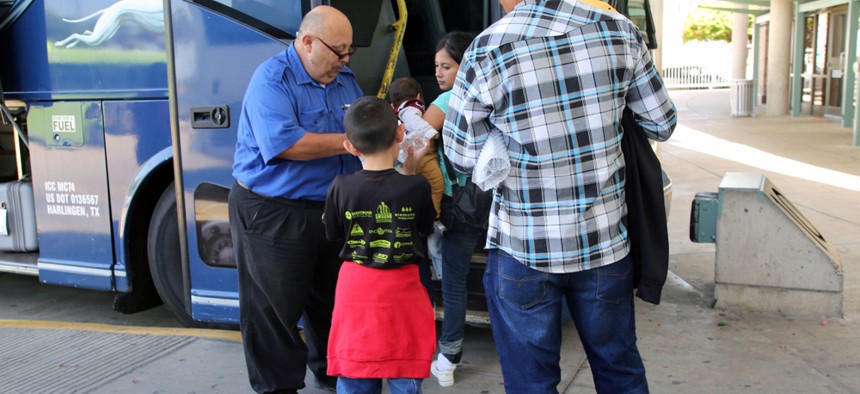No end in sight for migrant children housed by New York nonprofits
Hundreds of children have already arrived at 10 facilities run by organizations such as Rising Ground, The Children’s Village, and Cayuga Centers.

A bus driver takes tickets in 2017 from a group of Central American refugees going to stay with U.S. family while awaiting their Immigration Court hearings. Vic Hinterlang / Shutterstock
An executive order from President Donald Trump will put an end to separations between children and their parents at the U.S. border with Mexico, but it does nothing to strategize an endgame for New York nonprofits currently housing bereft migrant children.
Hundreds of children have already arrived at 10 facilities run by organizations such as Rising Ground, The Children’s Village, and Cayuga Centers. Hundreds more are expected to arrive in coming weeks.
There has been no direction from the federal government concerning what will come of them and their families. The latest executive order does not address the more than 2,300 children who have already been detained since April – separated from their families by U.S. Marshals at the border and placed in federally-contracted shelters through the U.S. Department of Health and Human Services’ Office of Refugee Resettlement.
“Kids are always traumatized whenever they are removed from their families,” Jeremy Kohomban, president of The Children’s Village said in a June 20 telephone interview. “It’s heartbreaking. It’s crazy.”
Nearly 20 separated children have arrived at the nonprofit’s Dobb’s Ferry facility this week. But neither the staff nor the children know how long they will remain at this facility, which typically provides short-term residential stays for undocumented children, homeless teens and youth in foster care or the juvenile justice system. NYN Media visited the facility in 2016 to observe its role in the Close to Home program, which places juvenile offenders at such facilities instead of incarcerating them in upstate prisons.
Kohomban added that he had “no idea what’s coming” from the federal government. Before any reunifications can occur, the federal government will have to decide whether to criminally ultimately prosecute the parents of these youth for crossing the border. Trump accompanied the latest executive order with talk of continuing the “zero tolerance” policy that led to the original round of separations at the border. That means children will likely be incarcerated with their families – but cannot be held in such conditions for more than 20 days according to a 1997 federal settlement. For the time being, the facility has been able to accommodate the immediate needs of the children, including providing language assistance beyond Spanish, according to Kohomban.
The idea that these child separations have happened under the Trump administration is ironic given that it recently supported passage of the the Family First Prevention Services Act - which Kohomban testified in support of before Congress. The legislation helps support preventive services to preserve family unity among children at risk of entering foster care.
Recent media attention has targeted nonprofits like The Children’s Village for their involvement with housing the children, leading to accusations that they are complicit in the federal policy, said Kohomban. Press coverage of the family separations also played a big role in turning public opinion against the family separations, which the Trump administration falsely blamed on Democrats after unilaterally implementing the policy.
Press accounts have also focused on past violent incidents at facilities, including at Dobb’s Ferry. But a few nonprofit “leaders that matter” made a point of reaching out directly to Kohomban and sending along words of encouragement.
“The New York nonprofit community is very supportive,” he said. “I need that.”
NEXT STORY: Giving USA's report sends mixed messages
